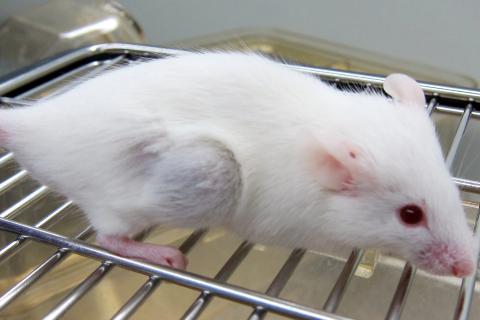The National Applied Research Laboratories (NARL) said it has bred an immunodeficient mouse that can serve as a host for human tissue and tumor transplants without forming a rejection response, which might have personalized cancer treatment and precision medicine applications, National Laboratory Animal Center director Yu Chun Chiang (余俊強) said.
Two strains of laboratory mice — the nude mouse and the severe combined immunodeficiency mouse — are commonly used as hosts for human tissue transplants, Yu said.
However, those mice retain partially functional immune systems, making the transplanted human cells unable to be strongly expressed in the mice until a few generations have been bred, over which period transplanted cells might mutate, compromising the accuracy of experiments, he said.

Photo: CNA / National Applied Research
The NARL cross-bred two strains of immunodeficient mice to create an advanced severe immuno deficiency (ASID) mouse, which lacks almost all forms of immune cells, so the mice show little or no immune response to transplanted cells, thus enabling grafted human cells to be examined, Yu said.
The NARL has successfully grown various tumor cells — including those of lung cancer, pancreatic cancer, blood cancer, skin cancer and breast cancer — in the ASID mice, something which could not be achieved with most types of immunodeficient mice, he said.
The ASID mouse is expected to enhance the accuracy of cancer treatment by allowing researchers to inject medication into mice carrying tumors directly transplanted from cancer patient to test which drugs are more effective against the tumor, he said.
The patient-derived tumor could be preserved in the ASID mice over generations to determine the biological marker and mechanism of the cancer, and to help develop new therapies and medicines, he said.
The ASID mouse is more cost-effective than its imported counterparts from the US and Japan, as an ASID mouse costs about NT$3,000 to produce, while an imported mouse costs between NT$15,000 and NT$30,000, Yu said, adding that the NARL can supply about 100 ASID mice per month.
The NARL said it is developing a second-generation ASID mouse, which would carry the human immune system to simulate human immune responses to create a type of mouse that more accurately mimics human responses for medical and immunological research.

Alain Robert, known as the "French Spider-Man," praised Alex Honnold as exceptionally well-prepared after the US climber completed a free solo ascent of Taipei 101 yesterday. Robert said Honnold's ascent of the 508m-tall skyscraper in just more than one-and-a-half hours without using safety ropes or equipment was a remarkable achievement. "This is my life," he said in an interview conducted in French, adding that he liked the feeling of being "on the edge of danger." The 63-year-old Frenchman climbed Taipei 101 using ropes in December 2004, taking about four hours to reach the top. On a one-to-10 scale of difficulty, Robert said Taipei 101

Nipah virus infection is to be officially listed as a category 5 notifiable infectious disease in Taiwan in March, while clinical treatment guidelines are being formulated, the Centers for Disease Control (CDC) said yesterday. With Nipah infections being reported in other countries and considering its relatively high fatality rate, the centers on Jan. 16 announced that it would be listed as a notifiable infectious disease to bolster the nation’s systematic early warning system and increase public awareness, the CDC said. Bangladesh reported four fatal cases last year in separate districts, with three linked to raw date palm sap consumption, CDC Epidemic Intelligence

US climber Alex Honnold left Taiwan this morning a day after completing a free-solo ascent of Taipei 101, a feat that drew cheers from onlookers and gained widespread international attention. Honnold yesterday scaled the 101-story skyscraper without a rope or safety harness. The climb — the highest urban free-solo ascent ever attempted — took just more than 90 minutes and was streamed live on Netflix. It was covered by major international news outlets including CNN, the New York Times, the Guardian and the Wall Street Journal. As Honnold prepared to leave Taiwan today, he attracted a crowd when he and his wife, Sanni,

Taiwanese and US defense groups are collaborating to introduce deployable, semi-autonomous manufacturing systems for drones and components in a boost to the nation’s supply chain resilience. Taiwan’s G-Tech Optroelectronics Corp subsidiary GTOC and the US’ Aerkomm Inc on Friday announced an agreement with fellow US-based Firestorm Lab to adopt the latter’s xCell, a technology featuring 3D printers fitted in 6.1m container units. The systems enable aerial platforms and parts to be produced in high volumes from dispersed nodes capable of rapid redeployment, to minimize the risk of enemy strikes and to meet field requirements, they said. Firestorm chief technology officer Ian Muceus said